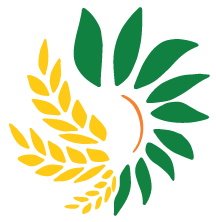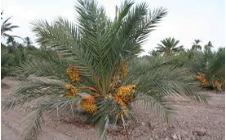Date Palm Tissue Culture
What is a Date Palm?
Phoenix dactylifera, commonly known as date or date palm, is a flowering plant species in the palm family, Arecaceae, cultivated for its edible sweet fruit. Although its exact place of origin is uncertain because of long cultivation, it probably originated from the Fertile Crescent region straddling between Egypt and Mesopotamia. The species is widely cultivated across Northern Africa, the Middle East, the Horn of Africa and South Asia, and is naturalized in many tropical and subtropical regions worldwide. P. dactylifera is the species of genus Phoenix, which contains 12–19 species of wild date palm plant varieties, and is the major source of commercial production.
A date palm plant typically reaches about 21–23 metres (69–75 ft) in height, growing singly or forming a clump with several stems from a single root system. Date fruits (dates) are oval-cylindrical, 3 to 7 centimetres (1.2 to 2.8 in) long, and about 2.5 centimetres (0.98 in) in diameter, ranging from bright red to bright yellow in colour, depending on the variety. They are very sweet, containing about 75 percent of sugar when dried.
Dates have been a staple food of the Middle East and the Indus Valley for thousands of years. There is archaeological evidence of date cultivation in Arabia from the 6th millennium BCE. The total annual world production of dates amounts to 8.5 million metric tons, countries of the Middle East and North Africa being the largest producers.
Why Date Palm?
Dry or soft dates are eaten out-of-hand, or may be pitted and stuffed with fillings such as almonds, walnuts, pecans, candied orange and lemon peel, tahini, marzipan or cream cheese. Pitted dates are also referred to as stoned dates. Partially dried pitted dates may be glazed with glucose syrup for use as a snack food. Dates can also be chopped and used in a range of sweet and savory dishes, from tajines (tagines) to puddings, ka’ak (types of Arab cookies) and other dessert items. Date nut bread, a type of cake, is very popular in the United States, especially around holidays. Dates are also processed into cubes, paste called ‘ajwa, spread, date syrup or “honey” called “dibs” or rub in Libya, powder (date sugar), vinegar or alcohol. Vinegar made from dates is a traditional product of the Middle East.
Dates provide a wide range of essential nutrients, and are a very good source of dietary potassium. The sugar content of ripe dates is about 80%; the remainder consists of protein, fiber, and trace elements including boron, cobalt, copper, fluorine, magnesium, manganese, selenium, and zinc. The glycemic index for three different varieties of dates are 35.5 (khalas), 49.7 (barhi), and 30.5 (bo ma’an).
The caffeic acid glycoside 3-O-caffeoylshikimic acid (also known as dactylifric acid) and its isomers, are enzymeic browning substrates found in dates.
Date seeds are soaked and ground up for animal feed. Their oil is suitable for use in soap and cosmetics. Stripped fruit clusters are used as brooms. Recently the floral stalks have been found to be of ornamental value in households. Young date leaves are cooked and eaten as a vegetable, as is the terminal bud or heart, though its removal kills the palm. The finely ground seeds are mixed with flour to make bread.
Why Hybrid Agri’s Tissue Culture Date Palm?
We at Hybrid Agri are renowned for our tissue culture date palm plants in India. We produce high–quality, pest and disease-free plants with practically complete field establishment. Our plants are characterized by uniformity, rapid growth, early fruiting, and high yield potential. Our trading company generates commercial quantities of high quality, genetically uniform plants of the most select and desirable varieties. Date Palm Tissue Culture at Hybrid Agri also grows to a mature plant very quickly giving you a quick and a wholesome yield. Two main methods are currently used for the multiplication of date palms: somatic embryogenesis and organogenesis. It is of high importance to ensure the true-to-type state of our trees by monitoring their genetic stability during the whole in vitro process. We have our tissue culture date palm for sale at a reasonable price per plant, which is guaranteed to be value for money.
Our tissue culture date palm plant has distinct advantages over seedlings or off-shoots:
- It is certified for the male/female gender.
- It is true-to-type to the variety
- It has high field survivability.
- It is free from disease and pest when supplied from our nursery.
- It gives date fruit of elite premium varieties which can be commercialised at attractive prices.
- Adequate planting material can be made available for large commercial plantations at any given time of the year.
Tissue culture date palm plants in India has seen major growth in the last few decades, and we are at the helm of this innovation. We at Hybrid Agri Pvt Ltd, are among the top tissue culture date suppliers in India. We will not only help you protect your yield from such plant diseases, but also help you maximize your output using our cutting-edge tissue culture technologies. We develop the tissue culture date plants in sterile containers as a protection from pests and pathogens, as well as for convenience in transportation.
Our tissue culture date palm plants not only give better yields than conventionally raised date trees, but also grow to maturity in considerably less time.The tissue culture technique employed by us provides us the opportunity to maintain the optimum growth conditions, thereby resulting in uniform growth of plants. All of this enables us to produce disease-free and healthy plants which ultimately results in increased profitability.


 WhatsApp us
WhatsApp us